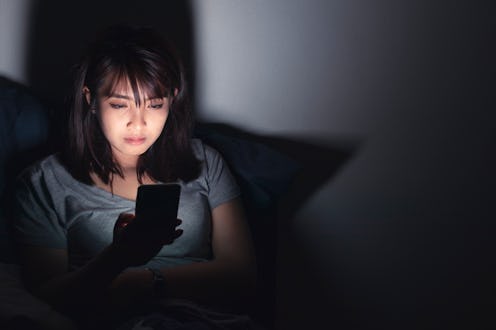Life
What Happens To Your Brain When You Check Your Phone In The Middle Of The Night

While it might feel like the perfect time to check emails or peep at texts, you really don't want to make a habit of looking at your phone in the middle of the night. Sure, you're lying there wide awake and can't seem to get back to sleep. But staring into a glowing screen is only going to make it worse, due to the way it impacts your brain.
By reaching for your phone, "you’re telling your brain it’s time to wake up," Dr. Jeff Rodgers, DMD, D-ABDSM, D-ASBA, a sleep expert and dental sleep medicine practitioner, tells Bustle. "The blue light from your phone mimics daylight and suppresses the production of melatonin, the hormone which regulates your sleep-wake cycle."
And it doesn't take much to have a negative impact. "Just glancing at the time can be enough to wake you up, while checking email, reading news, or engaging in other activities such as playing games or texting can make getting back to sleep difficult or impossible," Rose MacDowell, sleep expert and chief research officer at Sleepopolis, tells Bustle.
It's important to keep in mind, too, that these activities can spike anxiety, even if you're using them to "relax" and get back to sleep. "Checking texts, emails, and social media can cause your brain to go into 'worry-mode,'" Rodgers says. If someone didn't text you back, now you're wondering why. If you get an important work email, now you're thinking of a response. And none of that is conducive to sleep.
"Exposing your brain to your phone and thus 'reconnecting' to all the stressors in the world can activate anxiety, making it a lot more difficult to fall back asleep — particularly if, while 'sleeping,' half of your brain is actually waiting for a text or email to come through," Rodgers says.
Then, of course, there's the whole business of how blue light affects your REM cycle, which is "the brain’s most reparative stage of sleep," Rodgers says. "Being on your phone in the middle of the night disrupts your circadian rhythm, and as a result, you’ll be far more likely to stay in lighter stages of sleep as your brain is unable to fully shut down."
This can cause you to feel tired and sluggish the next morning, due to a lack of sleep. And what's worse, this type of sleep deprivation can lead to bigger health problems down the road. "Without proper REM, your brain is less able to process and consolidate memories," Rodgers says. "Poor REM sleep is even connected to a greater risk of dementia. We know that REM sleep helps clears out the brain protein tau, which is found in individuals with dementia," meaning lack of sleep may increase your risk.
Clearly, sleep is important. It's recommended that you get seven to nine solid hours per night, Bill Fish, a certified sleep science coach and co-founder of Tuck, tells Bustle. And that's why many experts suggest developing good sleep habits, including putting your phone away at least 30 minutes before bed, then resisting the urge to check it again in the middle of the night.
If you tend to sleep with your phone right next to you, consider charging it in another room and rely on a good, old-fashioned alarm clock instead. Or, set your phone alarm, and then "put it in a place where it would require you getting out of bed," Fish says, which will make it difficult to check it absentmindedly if you wake up.
It can also help to replace the habit of looking at your phone, as a way of falling back asleep, with something that'll actually do the trick. You could, for example, "focus on your breathing, try progressive muscle relaxation, or visualize a soothing environment," MacDowell says. "These types of techniques can signal the brain that there’s no reason to be alert, promoting relaxation and sleep."
You can even do some breathing exercises, like the 4-7-8 breathing technique, to help you focus on something calming instead of thoughts that increase anxiety, MacDowell says. Simply inhale for four seconds, hold your breath for seven, then exhale for eight seconds, and repeat.
That said, if it's been a while and you're still struggling to fall asleep, the best thing to do is get up. "Go ahead and get out of bed," Rodgers says. "Do something non-stimulating — no video games, working out, or watching TV — [and] try to avoid tasks that get you thinking about the next day, as well, such as making your lunch. Instead, do something relaxing — read a book, journal, color — whatever it is that helps you wind down without excess light, sound, or mental activity."
Do those things until you feel tired enough to try again, then head back to bed. This will be way better than checking your phone, which can mess with your melatonin, ruin your REM cycle, and stress you out — all things that can impact your brain, and make it difficult to get good sleep.
Experts:
Dr. Jeff Rodgers, DMD, D-ABDSM, D-ASBA, sleep expert and dental sleep medicine practitioner
Rose MacDowell, sleep expert and chief research officer at Sleepopolis
Bill Fish, certified sleep science coach and co-founder of Tuck